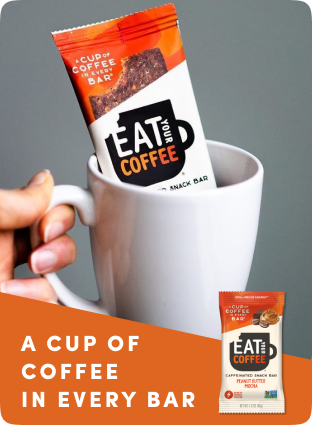When looking for a morning energy boost or want to tackle that afternoon slump, most of us will go for that shot of caffeine. Whether it's a cup of coffee, an espresso shot, or an energy drink, caffeine will undoubtedly get your energy levels back.
But which source of caffeine is best? Should you go for a cup of coffee or your favorite energy drink?
Well, if you are looking for a healthy option, you must know what ingredients each of these beverages contain. That's why we've prepared this energy drinks vs coffee comparison guide. Learn more about these beverages and see which one suits you best.
What is Caffeine?

Caffeine is a natural stimulant that belongs to a group of compounds known as xanthines. It is commonly found in various plants, such as coffee beans, tea leaves, cocoa beans, and guarana.
Caffeine stimulates the central nervous system, temporarily warding off drowsiness and restoring alertness. So, if you want to stay alert and energetic, the right amount of caffeine will do it.
Advantages of Caffeine
Caffeine offers several advantages when it comes to providing an energy boost. For instance;
- It enhances cognitive functions,
- Improve focus and concentration,
- Increase physical performance,
- And improves your metabolism.
However, you must not consume too much of it.
The Dark Side of Caffeine
While caffeine can be beneficial in moderation, excessive consumption can lead to negative side effects. Some individuals may experience symptoms such as;
- Increased heart rate
- Jitters
- Stomach upsets
- Headaches
- Anxiety
- Difficulty sleeping
Caffeine addiction and dependency are also potential concerns when consumed in large amounts over extended periods.
Energy Drinks vs Coffee: A Nutritional Showdown

The best way to determine the ideal beverage between energy drinks and coffee is to compare their nutritional aspects. So, let's find out which one outdoes the other.
Caffeine Content
Like coffee, energy drinks are known for their high caffeine content. On average, an 8-ounce energy drink contains around 80 milligrams (mg) of caffeine.
In contrast, an 8-ounce cup of coffee typically contains 95 mg of caffeine. However, it's essential to consider the serving sizes and the potential for consuming multiple servings in one sitting.
For instance, most energy drinks servings are usually from 12 to 16 ounces. This means that you consume more caffeine per serving when you take an energy drink than when taking a cup of coffee.
Calories Content
When it comes to calories, coffee is the winner. Black coffee, without any additions like sugar or cream, is virtually calorie-free as it contains only 2 calories. An espresso contains around 20 calories, according to Healthline.
On the other hand, energy drinks often contain added sugars and other ingredients, leading to a higher calorie count. Some of the popular brands, like Redbull or Rockster, contain around 200 calories. For instance, a 16oz Red Bull has 200 calories while Rockster has around 260.
Note: It's crucial to be mindful of the caloric intake, especially if you're watching your weight.
Nutrients Content
In terms of nutrients, coffee takes the lead again. Coffee contains essential nutrients such as riboflavin (vitamin B2), pantothenic acid (vitamin B5), manganese, and potassium.
Energy drinks, however, are generally low in nutrients. This means that they do not offer significant nutritional value beyond caffeine and added sugars.
Sugar Content
One area where energy drinks often fall short is their high sugar content. Many energy drinks contain excessive amounts of added sugars, which can lead to negative health effects when consumed in large quantities.
On the other hand, black coffee without any additions is sugar-free. However, it's essential to note that if you prefer flavored coffee or add sugar to your brew, the sugar content will increase accordingly. And too much sugar can lead to heart disease, obesity, or type 2 diabetes.
According to the American Heart Association, men should not exceed 36 grams or 9 teaspoons of sugar. Women, on the other hand, should not exceed 25 grams or 6 teaspoons of sugar.
Coffee vs Energy Drinks: Which One Takes the Day?

While energy drinks may provide a quick jolt of energy due to their high caffeine content, they often come with drawbacks. They contain excessive sugar and fewer nutritional benefits.
On the other hand, coffee offers a moderate amount of caffeine, negligible calories without additions, and the potential for beneficial nutrients. Therefore, you get the desired energy boost without compromising your health too much.
Reasons to Choose Coffee for an Energy Boost
Both of these beverages have caffeine, which might have some negative effects on your body. However, as we have seen, coffee seems better than most energy drinks. Here are the main reasons:
- Moderate Caffeine: Coffee provides a moderate amount of caffeine, enough to increase alertness and focus without the risk of excessive intake.
- Antioxidant Benefits: Coffee is rich in antioxidants, which can help fight against free radicals in the body and potentially reduce the risk of certain diseases.
- Natural and Customizable: Coffee is a natural beverage that can be brewed according to personal preferences. Whether you enjoy it black, with milk, or prefer various flavor options, coffee allows for customization.
- Lower Sugar Intake: By opting for black coffee or minimizing sugar additions, you can significantly reduce your overall sugar intake compared to energy drinks.
- Established Cultural Role: Coffee has long been a part of various cultures and traditions, offering a social and enjoyable aspect to the energy-boosting experience.
Best Coffee Alternative
I know your love for a cup of coffee might be irreplaceable with anything else. However, I have something that you might love to try out – Eat Your Coffee energy bars.
Are they good as coffee? Absolutely yes, and even better!
These energy bars have the same amount of caffeine that you get from a cup of coffee. This means that when you take one energy bar from Eat Your Coffee, you get the same energy boost as if you took your favorite cup of coffee.
Even better, the bars are made from natural coffee, are gluten-free, and are vegan-friendly. They are also packed with healthy nutrients that are even more beneficial to your body.
Lastly, Eat Your Coffee bars are convenient to take anywhere and will not cause caffeine jitters or stomach upsets. So, do you want to try them out? Use the Discount Code TRY to get yourself a Free Sample. Pay only $3 for shipping.
FAQs
Is it safe to consume energy drinks every day?
While occasional consumption of energy drinks is generally considered safe for most individuals, daily consumption can lead to health risks due to the high sugar and caffeine content. It's advisable to moderate your intake and opt for healthier alternatives like coffee.
Can coffee improve cognitive performance?
Caffeine in coffee can temporarily enhance cognitive functions, improving focus, alertness, and mental performance. However, individual responses may vary, and excessive caffeine intake can lead to negative effects.
Are energy drinks suitable for athletes?
Energy drinks are often marketed to athletes for their potential performance-enhancing effects. However, it's crucial to consider the overall nutritional profile and potential side effects. Consulting a healthcare professional or sports nutritionist is recommended for personalized advice.
How much caffeine is considered safe?
Moderate caffeine consumption, typically up to 400 mg per day for healthy adults, is generally considered safe. However, individual tolerances may vary, and it's important to be mindful of caffeine from other sources as well.




